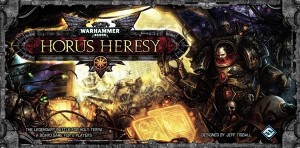 Recently I’ve been inducted into the Warhammer 40k universe. A friend of me loaned me a book when I was searching for something new to read and I’ve since become hooked on this series. As usual, when I get drawn into a new world, I get the bug to play a board game in that setting. The good thing is I didn’t have to go far to find a Warhammer 40k game. I looked at a few of them, but the shear size of Horus Heresy was the first one to catch my eye.
Recently I’ve been inducted into the Warhammer 40k universe. A friend of me loaned me a book when I was searching for something new to read and I’ve since become hooked on this series. As usual, when I get drawn into a new world, I get the bug to play a board game in that setting. The good thing is I didn’t have to go far to find a Warhammer 40k game. I looked at a few of them, but the shear size of Horus Heresy was the first one to catch my eye.
Horus Heresy seeks to recreate the epic battle for Terra from the Warhammer 40k book series of the same name. One player takes on the forces of the traitor Horus while the other player must defend the Emperor from Horus’s treachery. Does Horus Heresy do justice to this great book series or should it be banished to the warp? Read on to find out!
Horus Heresy is a 2 player, card drive war game that plays in about 2-3 hours.
Game Overview:
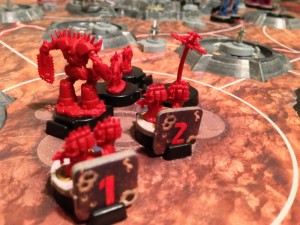
The traitor Horus has arrived on Terra and is trying to kill the Emperor. Each player will take charge of one of these two factions during the game. The game takes place on a large game board smartly divided into different zones. Players will issue orders and either carry them out immediately or place them face down on the strategic map to be executed later. In either case, as a player executes orders, they move their marker up on the all important initiative track.
The initiative track is really the central mechanic of the game. As players take actions, they move their marker forward. Whoever is behind on the track gets to take actions until they are ahead on the track again. Players must smartly choose their actions because the track also acts as a game timer. Players will fight each others units until one of the game’s four victory conditions have been met.
Components:
As with any Fantasy Flight Game, Horus Heresy does a great job with all the bits that come in the box. The first thing you will notice is the large, 3D game board. The board has 3D plastic fortifications that a player’s units can use in their defense. In additional to being functional in the game, they also look really cool.
Speaking of units, Horus Heresy comes with a ton of plastic miniatures. Players get to control troops ranging from Space Marines to the huge mechanical Titans. I also liked that each faction has their own somewhat unique looking minis in various colors. Once the game is setup and in progress, it’s hard not to admire the sheer scale of Horus Hersey
The game also induces a number of different cards and cardboard tokens that you might expect to get. I should mention what I feel is a big miss in the game though. The Primarchs (the big heroes for each side) were made with cardboard tokens in plastic stands rather than sculpted plastic minis. I have no idea why Fantasy Flight went this route, but it was a bit of a let down compared to how cool the rest of the figures look. Other than that though, the components that come with Horus Heresy are high quality and quite numerous.
How to Play:
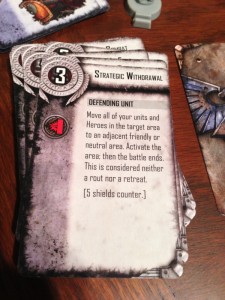
The rulebook for Horus Heresy clocks in at some 44 pages, so I’m not going to give you a detailed explanation for how the game fully works. I’ll shoot for a high level overview here and if you want all the nuts and bolts, you can download the rulebook here.
To start the game, players get a few options for which scenario they want to play. The first scenario is probably the one most players will opt for though. Brother Against Brother pits Horus in a battle to kill the Emperor. Simple Enough. After the scenario is chosen and the game setup (this takes a bit of time), the players are ready to begin.
The game is played over a series of rounds, with each round having 4 phases.
1. Action Step: Players choose 1 from the following actions:
- Place an order face down on the strategic map. (1 point)
- Execute an order from the strategic map. (1 point)
- Execute an order from your hand (0-3 points)
- Bury an order on the strategic map (1 point)
- Draw an order card (1 point)
2. Advance Initiative Marker: You advance your marker a number of points based on what you did in the above step. If, after that, your marker is still behind your opponents, you may take another action. If your marker is now ahead of your opponents, proceeded to step 3.
3. Change of initiative step: At this point players check to see if any coexistent battles need to be fought (if there are still 2 opposing troops still in the same area) and stacking limits are enforced.
4. Resolved Special phases if necessary: If the player moved his initiative marker past one of the special phase icons on the track, than that step is carried out. This may be drawing order cards, playing event cards or refreshing troops in the field.
Turns carry out in that fashion, back and forth, until one player has won. Eventually though, this war game will have some combat. So how does combat actually work? Good question!
Combat is completely diceless and is carried out in a variable number of iterations (rounds). At the start of combat, each player counts up their total troop strength, then divides that number in half. That’s how many combat cards they get to draw. A player might also get bonus cards if they have a hero (Primarch) at the battle. Each combat card will have an attack value, possibly some defense icons and usually a special power.
Combat itself is played out over a number of increasing iterations. In each iteration, the active player can play a number of combat cards up to the iteration value. So in iteration 2, the player may play 2 combat cards. In iteration 3, 3 cards, etc… Players alternate iterations being either the attacker or defender. When the attacker plays a card, they total up the attack value on all cards played and do that much damage to the defender’s troops. This amount can be reduced by the defending playing defense cards. Any excess damage is enforced by damaging troops of the attacker’s choice. Combat continues until one side has lost all of their troops or the combat has reached the maximum number of iterations (decided by the action card used to stat the combat).
And that’s Horus Heresy in a nutshell. There are a ton more rules to the game, such as orbital bombardment, moving around the board, corrupting units, hero units with their own special powers, and fortifications. You can check out the rulebook if you want more info on all of that.
The game progresses until one of four victory conditions happens. Either Horus or the Emperor have been killed, if Horus controls all 4 space ports or if an initiative marker reach the end of the track. In that case, the Emperor wins.
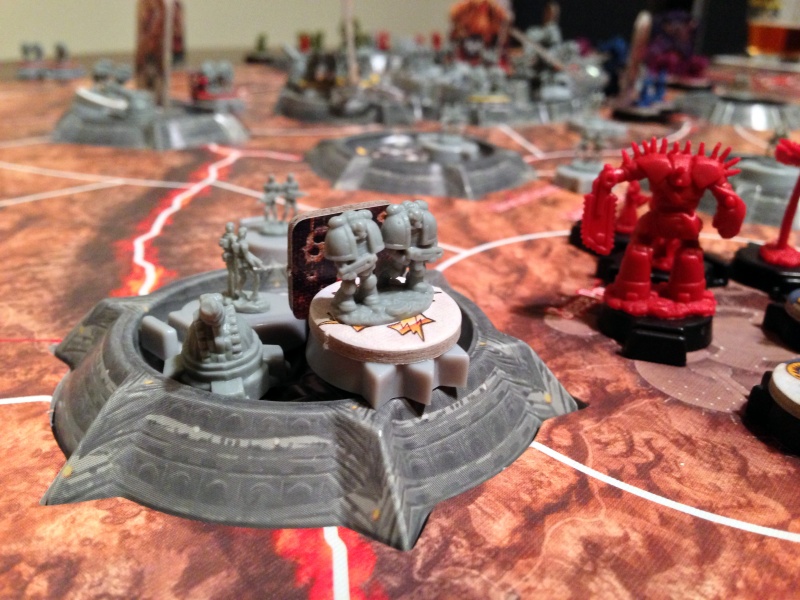
Game Experience:
Horus Heresy is a deep game that is very rich in theme. Any Warhammer 40k fan is going to have a great time with this board game. All of the familiar faces are there and recreating the historic battle from the books makes for an enjoyable experience. Does that mean players who haven’t read any of the books won’t enjoy this game? I’d say not necessarily. Horus Heresy is an interesting war game that portrays an epic battle between two powerful sides. You don’t have to be knee deep in story to enjoy that. But if you are, it will only add to your enjoyment.
So yes, Horus Heresy has a really strong theme and the game utilizes it quite well. One of the things that helps tie the theme to the game is Horus Heresy’s fantastic components. From the excellently sculpted minis to the very well laid out 3d board, Horus Heresy is just a joy to behold. Even the cards are both very functional and include thematic Warhammer artwork. These two elements combined help to provide a rich game play experience for Horus Heresy.
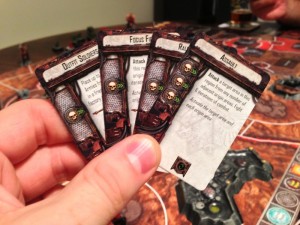
But that brings us to the game play. Even the best components in the world won’t matter if the game play is unengaging. Fortunately, that’s not the case with Horus Heresy. While the game play isn’t perfect, it’s still a very well thought out game. One of the problems though is the game is almost a little too complicated for it’s own good. I feel like the designer might have gone overboard in certain areas.
For example, in combat you are fighting a number of iterations based on the card use to start it. This might be 4, or 6 or even 8. Then, to get going, you have to sum your units strength, divide by two rounded up. Then you add in cards if you have a hero present. 1 to 2 more cards. Then you can only play cards up to the iteration number. Finally, on each card you will have to figure out which abilities can be played and when, how many shields you have access to and which cards are useful only for their combat value. One of the hard parts is figuring out how all the special abilities work. You have to have the right unit in the battle and in the right situation. It’s feels a little clunky at times. Even with all these rules added in, combat can still be fairly random. Luck of the draw will have a big effect on the combat. If you draw almost no shields or if you only get cards with special abilities for units not at the battle, you’ll be at a disadvantage. I didn’t get into movement rules, but there are at least 3 pages in the rule book explaining those. I think Horus Heresy could have been paired down some and still been an excellent game.
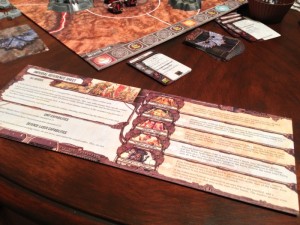
But even with its thick rule book and some needlessly complex rules, Horus Heresy really hits the mark with its initiative track system. This is a great way to manage the flow of the game. I was a little skeptical at first because it reminded me of the time track in Red November (which I hated because of all the down time), but in Horus Hersey it works perfectly. It strikes the right balance of carefully planning your actions and keeping the game moving. This is more so true because the track acts as a countdown to the game end. At the beginning of the game, the Horus player might have no issues about playing a 3 point card form his hand. But as that marker moves closer to the Emperor winning, Horus will start getting a little nervous about spending those precious points. Combine all that with some well placed phase markers on the track and you have something that keeps the game moving and keeps players very engaged.
Speaking of ending the game, I also really liked how the game has multiple ways to end. And let me add that none of them are easy to achieve. Horus Hersey is a very tight game that has a great ebb and flow to it. Once side will seem to have the upper hand only to have a strategically placed card switch the tide of the game. During our games, we constantly would have each player close to a different objective at the same time. Horus Heresy requires players to stay on their toes and adapt throughout the game.
My only other gripe with the game is how much the luck of the draw will factor into things. You can only activate units that you have cards for. Sometimes there will be a hard fought battle over a region of the board, but a player couldn’t follow up and secure that area because he wasn’t able to get the right cards in his hand. It can be very frustrating to have a sizable force sitting around doing nothing because you can’t activate them. I almost wish they had allowed players to activate any troops they want on their turn. At the end of the day it isn’t a bad system, but be prepared for some frustrations. If you are expecting a Warhammer 40k version of Axis and Allies you are going to be sorely disappointed. Side note: I’d play the hell out of a Warhammer 40k version of Axis & Allies.
Final Thoughts:
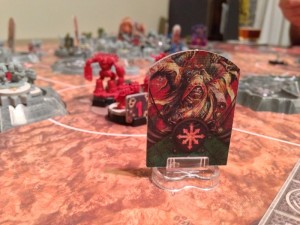
At the end of it all, Horus Heresy is still a really well put together game. From its rich theme to the game’s solid components, any Warhammer 40k fan is going to get a lot of bang for their gaming dollar. Horus Heresy isn’t a casual gaming experience though. Each game will probably clock in at 2-3 hours of play time. Add this onto the complex rules and, unfortunately, Horus Heresy probably won’t be making its way to the gaming table too often for all but the most die hard fans.
For casual players who aren’t fans of the series, I don’t think I’d recommend this game for them. If you want a war game, there are probably a lot better options out there. But for fans of the Warhammer 40k universe that want to control some of their favorite characters from the books, this is a great choice. Yes the game is sometimes needlessly complex and the luck of the draw will be annoying at times, but Horus Heresy ends up being a really solid game with some intense moments. The components, theme and fun initiative track mechanic help kick it up a notch on the scale making what would be an OK war game into a great experience for a true Warhammer 40k fan.
If you are interested in getting a copy for yourself, it’s about $69
Final Score: 3.5 Stars – A fun theme combined with some great components make this one a joy to play for Warhammer 40k fans.
 Hits:
Hits:
• Great theme
• Fantastic components
• Initiative track mechanic keeps the game flowing and works really well.
• Battle feels epic in its scale and will be fiercely competitive.
Misses:
• Can be needlessly complex in some areas
• Luck will be a big factor sometimes
• Primarch figures are cardboard tokens instead of minis




















